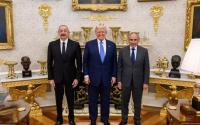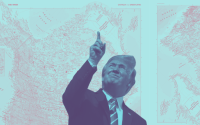3 Ağustos 2005Stephen Castle
Turkey's hopes of starting EU membership talks in two months took a nosedive yesterday when Paris threatened to wreck negotiations unless Ankara first recognises Cyprus.
In comments that could spark another Anglo-French rift, France's Prime Minister, Dominique de Villepin, suggested that Turkey's accession negotiations could be delayed unless it extends diplomatic recognition to the government in Nicosia. Such a climbdown is unacceptable to the Turkish government, whose ambitions to join the EU are backed by Britain which holds the EU's rotating presidency.
Speaking on Europe 1 radio, the French premier said: "It doesn't seem to me that a process of negotiations can start with a country that doesn't recognise each one of the members of the EU." Asked whether the negotiations, due to be launched on 3 October, might have to be put back, he replied: "Absolutely."
Ankara recognises only a breakaway Turkish Cypriot enclave in the north of the island, partitioned since 1974 when Turkish troops invaded after a failed coup by supporters of union with Greece. The Greek Cypriot government in the south joined the EU last year as the sole legitimate representative of the whole island.
M. de Villepin's comments raised the temperature in an increasingly fractious debate over Turkey's European vocation.
Britain has said repeatedly that Turkish recognition of Cyprus is not a precondition for starting talks.
That was backed yesterday by the European Commission. It said that, while it accepts Turkey's refusal to recognise Cyprus is a problem, the issue should be resolved within the framework of separate, UN-sponsored talks on the future of the divided island.
Turkey had been told by the EU that, before the start of talks, it must extend a customs union to include all nations inside the 25-nation bloc, including Cyprus. In a delicate piece of diplomacy, Ankara fulfilled that obligation last Friday while issuing a declaration insisting that did not amount to formal recognition of the Nicosia government.
EU diplomats were still trying to assess the practical significance of the latest comments from Paris which could derail the opening of talks since each EU member state must agree to a mandate for the negotiation. One way of preventing talks would be to add preconditions known to be politically impossible for Ankara.
Significantly M. de Villepin did not go so far as to threaten to block the 3 October starting date, and supporters of Turkey's bid do not believe Paris will go out on a limb to stop talks. The French President, Jacques Chirac, supports Turkey's bid and signed up to European Council conclusions that do not make recognition of Cyprus a precondition of talks.
Most diplomats assume the negotiations would definitely begin, even if they are destined never to be concluded. But sentiment in France and several other countries, including Austria and the Netherlands, is extremely hostile to the prospect of Turkey joining the EU.
"No" votes in both the French and Dutch referendums on the EU constitution followed debates in both countries about Turkish membership.
M. de Villepin's ministerial colleague and rival, Nicolas Sarkozy, is opposed to Ankara's bid as is the German opposition leader, Angela Merkel. Ms Merkel is well placed to win federal elections in Germany next month. France has pledged to hold a referendum before any decision to admit Turkey to the union.






